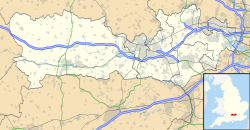| Site of Special Scientific Interest | |
 | |
| Location | Berkshire |
|---|---|
| Grid reference | TQ 012 735 [1] |
| Coordinates | 51°27′04″N0°32′42″W / 51.451°N 0.545°W |
| Interest | Biological |
| Area | 117.2 hectares (290 acres) [1] |
| Notification | 1992 [1] |
| Location map | Magic Map |
Wraysbury and Hythe End Gravel Pits is a 117.2-hectare (290-acre) biological Site of Special Scientific Interest in Wraysbury in Berkshire. [1] [2] It is part of South West London Waterbodies Ramsar site [3] and Special Protection Area. [4]
Contents
The site features four former gravel pits and is within the floodplains of the River Thames and the Colne Brook. [5] It is important for the number of bird species it features. [6]
